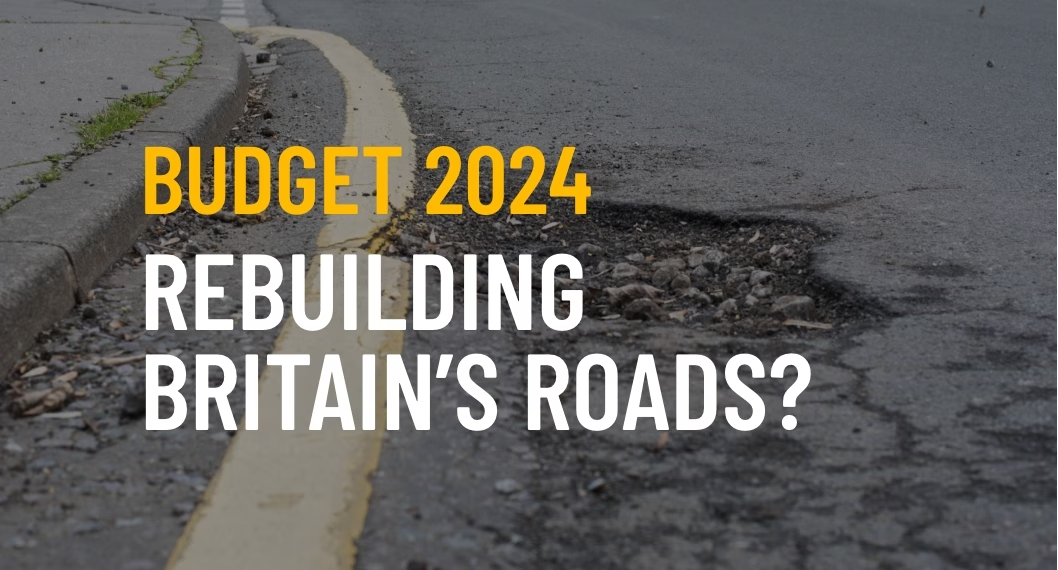
Budget 2024 – Rebuilding Britain’s Roads?
Last month, as part of Budget 2024, Chancellor Rachel Reeves announced an additional £500 million allocation to address the dire state of the road network across Britain. The move was met with some scrutiny by industry experts, with many saying that although the funding exceeds the £320 million previously planned by this Parliament, it falls short of addressing the significant backlog caused by years of austerity.
A Network in Decline
Local road conditions across England and Wales have deteriorated year-on-year over the last 2 decades. Between 2000 and 2008, the local road repair budget averaged around £4bn per year. However, in the face of the 2008 financial crisis, the Government cut funding dramatically, and so began 10 years of severely under-resourced local authorities.
Speaking about the critical decline of the network, Chair of the Asphalt Industry Alliance (AIA) David Giles says:
“We know from ALARM that the condition of our local roads is at an all-time low, and that this is the result of decades – not just recent years – of underfunding as well as the effects of all the physical and climatic challenges on a deteriorating network.”
By 2019, the situation was so bad that the DfT estimated that the pothole backlog would cost £11bn to fix. This led to the Government creating the Potholes Fund in 2020, with a pledge to award £500 million each year between 2020 and 2025 to tackle the worsening crisis. However, despite this extra funding, the cost of fixing the backlog now sits at over £14bn.
Too Little Too Late
The additional funding announced in Budget 2024 can be viewed as a step in the right direction, but it goes nowhere near far enough to undo the neglect of road maintenance in recent years. Roads across England and Wales are now at a stage where more than half the network has less than 15 years of structural life left, meaning they are already past the point of efficient repair in the road lifecycle. In addition, materials and labour are significantly more expensive now, so any funding accomplishes far less than it did 5 years ago.
With over one million potholes waiting to be filled, and a large portion of the road network in structural disrepair, it stands to reason that new defects will continue to spring up as the older ones are patched. The average lifespan of a traditional throw-and-roll repair is less than three months, meaning the entire exercise is akin to shovelling quicksand.
Paving the Way Forward
Before we can even begin to consider the way forward, there needs to be a commitment to sustained, adequate funding. You simply cannot fix a decade of neglect with once-off funding. If local councils could avail of a predictable, long-term funding model, they would be better equipped to plan and prioritise both reactive and proactive maintenance work.
Advances in Road Maintenance Technology
Adopting and employing modern equipment and technology is the first tangible step toward clearing the backlog. With advanced spray patching machinery, it is now cost and labour-efficient to repair early defects as and when they occur. Along with this, spray patching offers greater material control and a more durable fix, meaning defects don’t need to be refilled again in 3 months. This allows the opportunity to clear the backlog so that councils and contractors are no longer chasing their tails.
With advanced road maintenance technology in place, local authorities can take a more preventative approach to their road maintenance, which preserves the lifespan of the road even further.
Conclusion
The additional funding announced in Budget 2024 is a positive move, but without a commitment to long-term funding, it is little more than a band-aid on a gaping wound. What is needed is a comprehensive multi-year funding plan from Government combined with a shift in approach and willingness to adopt modern technology from councils and maintenance contractors.
This sentiment is echoed by David Giles, who says:
“We urge the Chancellor to commit to adequate sustained, targeted and accountable funding for local roads – provided on both a needs and improvement basis – over the long term. This will allow local authorities to plan and proactively carry out the right maintenance intervention at the right time to the greatest benefit of all road users, rather than just having enough money to address immediate and urgent repairs. Without it there will be a continual decline in the condition of our local roads on which we all rely.”
Interested in learning more about how you can take a preventative approach to road maintenance? Read our Road Maintenance Revolution Guide, or talk to Roadmaster’s team of expert engineers today.